A Night of Solidarity and Resilience in NYC
The event
On the Tuesday night of February 19th 70 people came together from all the boroughs in New York City for dinner and conference to explore ways they could support each other's work and grow a movement. In the aftermath of the devastating Hurricane Sandy they named the event "Growing a Resilient City: possibilities for collaboration in NYC's Solidarity Economy."
The event was the culmination of SolidarityNYC's Deep Listening Project (DLP). SolidarityNYC is a collective of volunteer organizers, artists, academics, and community members who seek to support, promote, and connect NYC's Solidarity Economy (SE). Beginning in June of last year members of the Collective fanned out across the whole city to interview and record the thoughts and feelings of 38 leaders in NYC's SE. Cheyenna Weber, who is the director of Coalition Building and Campaigns for the New Economics Institute, served as project director.
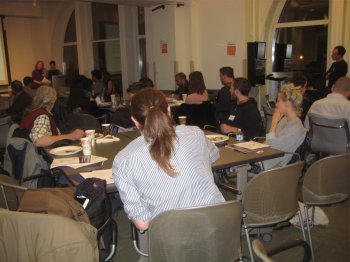
Close to 50 organizations were represented at the Growing A Resilient City event. Here are some of the participants during the Dinner/Introduction session of the evening.
With a team of 11 volunteers, they then transcribed all of these interviews. Working with researchers Olivia Geiger of the University of Massachusetts, Amherst and Evan Casper-Flutterman of Rutgers University, the team then studied, processed, and digested all of the information they had gathered into a formal report: Growing a Resilient City: Collaboration in New York City's Solidarity Economy.
After dinner, catered by the worker co-op I Love Food, and introductions, the 60 participants and 10 SolidarityNYC staffers broke into seven small groups, each discussing one aspect featured in the report. Those interviewed through the DLP had essentially identified four major areas for collaboration:
- Building visibility
- Strengthening our organizations
- Building economic power
- Building political power.
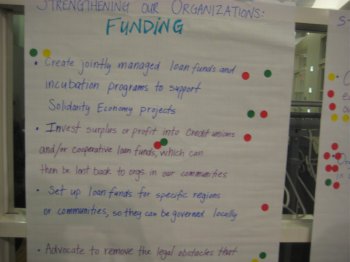
Participants in the small group that explored collaborative funding and financing decided to continue as an ongoing working group. The hanging sheet lists the topics their work will embrace. The placing of dots on the sheets is how everyone prioritized what the small groups would discuss.
Participants at the event chose to focus on either one of these primary areas or on a sub-area of them. Those most interested in Training, Skill Sharing, and Capacity Building formed two groups, as did those interested in Building Political Power. Others chose to focus on one of the following topics: Space Sharing and Collaborative Administration, Collaborative Financing and Funding, and Resources Needed for Movement Building.
After an hour of discussing everyone re-grouped as a whole. Each group gave its report back on the outcomes of their respective discussions. Two groups–"Training and Capacity Building" and "Collaborative Financing"–decided on the spot to become ongoing working groups. Before bringing the event to a close a strong consensus emerged to meet again as a whole group in three months.
Niral Shahl of NYU Law School helped Collective members with the facilitation of small group discussions. Kenneth Eudusei of SolidarityNYC and Ben Fuller-Coogins of NYU's Wagner Institute were floor managers for the event.
(A list of all the organizations represented at the resilient event is at the end of this article.)
Solidarity Economy?
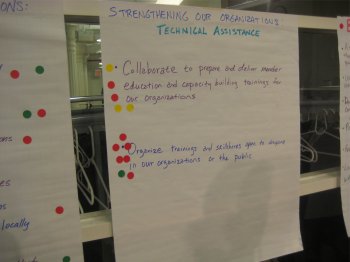
Participants in the small group that explored training and capacity building also decided to continue as an ongoing working group. The hanging sheet lists the topics their work will embrace.
In the introduction to the evening there was also discussion of the use of the term "solidarity economy" and its framework. Many solidarity economy practices are framed as "the commons," "the sharing economy, " "collaborative consumption, "alternative economy," "cooperative economy," "green economy," "resilient economy," or the new economy."
Annie McShiras, a Collective member who also works as the Development Director at the Responsible Endowments Coalition, explained why SolNYC tends toward "solidarity economy:
We organize under the framework of "solidarity economy", first and foremost, because we stand with the global justice movement that identifies with this term, led mainly by organizers in the global south. The term originated with the Landless Workers Movement (MST) in Brasil and was later popularized at the first World Social Forum held in Porto Alegre, Brasil, in 2001.
We consider our efforts part of the anti-globalization movement that seeks community control rather than transnational corporate control.
We also use the term "solidarity economy" because we see ourselves as allies working in solidarity with communities and practitioners around the world who have been building sustainable economies from the ground-up for centuries. This is not a new concept; it is ages old so we use solidarity terminology to respect those struggles for common land, water, and livelihoods of the global south. Those struggles are also prevalent in our own communities here in NYC, and our work to support and be in solidarity with those struggles must be reflected in how we speak of economics.
Zara Serabian-Arthur, a media maker at Meerkat Media Collective and a member of SolidarityNYC, added:
We identify "solidarity economics" as the ways we collectively meet our needs that utilize values of democracy, cooperation, social justice, ecological sustainability, and mutualism. We believe solidarity is the practice of taking active responsibility for our interdependence and binding our fates together in shared struggle and livelihood.
Caroline Woolard of Our Goods and the Trade School project noted that the collective's work, which started in 2009 at US-SEN's Solidarity Economy Conference at the University of Massachusetts, Amherst, included "an online map, short films, educational events, and organizing collaborative efforts between groups," Zara Serabian-Arthur, a media maker at Meerkat Media Collective and a member of SolidarityNYC, pointed out.
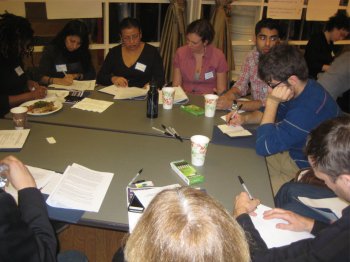
One of the seven small discussion groups at the Growing a Resilient City event.
The Deep Listening Project
The Deep Listening Project, originally sketched out by Amelia Bryne, another Collective member currently in Sweden, explored the challenges, existing collaborations, & new opportunities in NYC's solidarity economy from the perspectives of 38 groups from across the city. It had three phases to this project:
- conducting, recording, and transcribing the interviews,
- analyzing and digesting the information into the Growing a Resilient City: Collaboration in New York City's Solidarity Economy report, and
- bringing participants, staff, and others together to meet each other collectively, celebrate what had been achieved, and identifying next steps.
This project grew out of a desire to see greater economic and political power for the many people involved in alternative economic work. As Michael Johnson, a member of the Ganas Intentional Community as well as the SolidarityNYC Collective, expressed it: "We believe NYC needs grassroots economic development, not top-down development that only lines the pockets of the elite. We want to see healthy and safe communities where we meet our needs in ways which help, rather than hurt, the whole."
The core idea was to learn how the people who were doing this work were already working together, and hear any thoughts they had about how they might be able to collaborate even more deeply. The interviews succeeded in producing about 45 different ideas for how solidarity economic projects and organizations could work together. The SolidarityNYC team synthesized these different ideas into four main strategies:
- Building visibility – where we heard strategies for working together to shift consciousness and increase awareness of the 'other economies' that already exist by working together on education, outreach, communications, and marketing.
- Strengthening our organizations – ideas for creating or strengthening financial sources for our work; finding creative ways to share our labor and skills; collaborating on admin and overhead; jointly tackling capacity building and training;
- Building economic power – ideas for buying more of each other's stuff, strengthening "value chains," connecting to each other at all steps of the process, from financing, to production, to consumption, etc.
- Building political power – ideas for advocating together for policy change that can shift the terrain and level the playing field, ideas for strengthening connections and synergies between advocacy & organizing efforts and efforts to 'build another world,' etc.
Interviews included 38 groups from across the city. Overall, interviewers from the Collective talked with leaders from the following SE sectors:
- Community development credit unions,
- finance,
- worker co-ops,
- food co-ops,
- housing co-ops,
- producer co-ops,
- intentional communities,
- community gardens,
- community land trusts,
- time banks & barter,
- health,
- art
as well as social enterprise, participatory budgeting, and movement spaces.
SolidarityNYC limited its sample to groups primarily engaged in "economic" activity. "Obviously this was an imperfect process," said Lauren Hudson, who also works with the NY Writers Coalition. "We know that there are many important organizations working within this new economy that we left out. It was not possible for the project to be comprehensive at such an early stage."
Weber added that "as we go forward we can plan to continue to bring in groups not represented here, and begin to build ties to other organizations and communities actively engaged in social justice movements." She said this was an essential part of the long-term project.
SolidarityNYC's next event is a fundraiser on Friday March 22 at The Commons in Brooklyn. More details to be announced as the event gets closer.
The organizations represented at the Resilient City event included:
- A New World in Our Hearts
- Black Women's Blueprint
- Brooklyn Queens land Trust
- Brooklyn Yoga Collective
- Bushwick Food Co-op
- C-squat
- Center for Family Life
- From Here: Making Our Future
- I Love Food Co-op
- Jersey City Food Co-op
- La Familia Verde
- Legal Aid Society
- Line Break Media
- Lower East Side People's Credit Union
- Meerkat Media Collective
- Milk Not Jails
- Movement Space Project
- Neighborhood Economic Development Advocacy Project
- New York City Community Gardens Coalition
- New World in Our Hearts
- NYU Law
- OccuCopy
- Occupy Wall Street
- Park Slope Food Co-op
- Participatory Budgeting Project
- Prospect Monday/Occupy Sandy
- Queens Harvest Food Co-op
- Regeneracion Childcare
- Resilience Network
- Si Se Puede
- Tanzania
- TimeBankNYC
- Trade SchoolNY
- Working World
- 040–Occupy Sandy
- 3B
- 4th Street Co-op
- 596 Acres

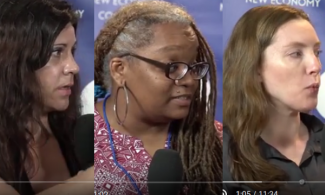
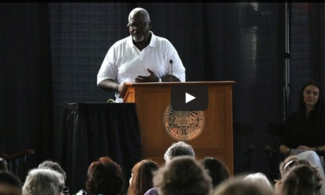
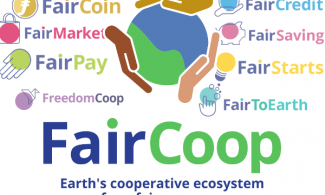
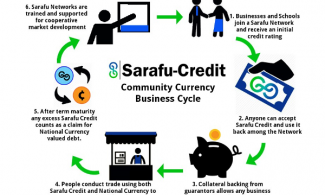
Add new comment